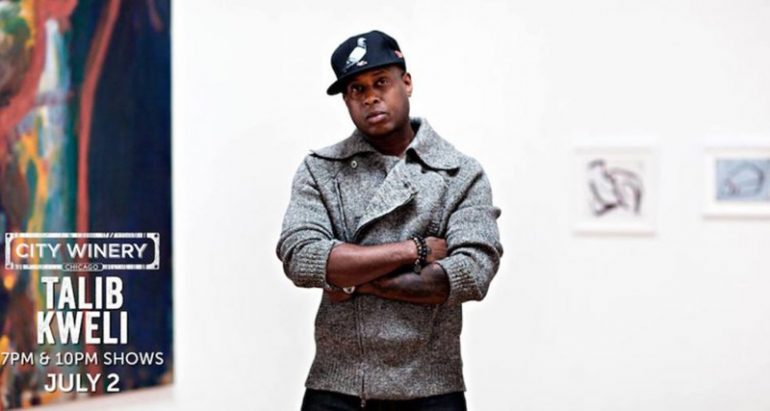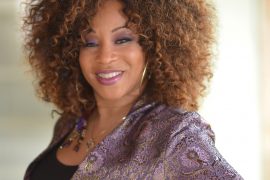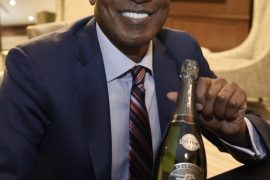After nearly 20 years of releasing mesmerizing music, Talib Kweli stands as one of the world’s most talented and most accomplished Hip Hop artists. Whether working with Mos Def as one-half of Black Star, partnering with producer Hi-Tek for Reflection Eternal, releasing landmark solo material or collaborating with Kanye West, Pharrell Williams, Just Blaze, J Dilla, or Madlib, Kweli commands attention by delivering top-tier lyricism, crafting captivating stories and showing the ability to rhyme over virtually any type of instrumental.
In 2011, Kweli founded Javotti Media, which is self-defined as “a platform for independent thinkers and doers.” Kweli has set out to make Javotti Media (which released his 2011 album, Gutter Rainbows, and is named after his paternal grandmother) into a media powerhouse that releases music, films and books. (via TalibKweli.com)
N’Digo recently sat down with Kweli to discuss a variety of topics including how his career took off, being instrumental in kickstarting the career of Kanye West, and the incredible story behind the making of the heartfelt Hip-Hop classic “Respiration”.
Growing up in Brooklyn, who were you musical influences as a kid?
My top three favorite emcees growing up when I was in Jr. High were Ice Cube, Q-Tip and KRS-One. I listened to them the most in addition to De La Soul, Rakim, Kane, Slick Rick…really it was like anyone who dropped an album in ’88. EPMD, MC Lyte, N.W.A., Public Enemy, all that Golden Era stuff. If you google the Hip-Hop albums of 1988 I was probably rocking it.
I know you listened to a variety of genres as a kid. What else were you into?
Yeah I was actually late to Hip-Hop. Most people assume a young black kid growing up in Brooklyn was always listening to Hip-Hop but I wasn’t. I was listening to Pop music and my father had an extensive record collection. When you’re a little kid at 7 or 8 years old, you’re also listening to whatever the radio plays. Lots of Madonna, Duran Duran, Tears For Fears and that stuff. But I also knew about 50’s Rock N’ Roll. I knew about 70’s Soul, Motown, Funk, etc. I knew about all this stuff and the only Hip-Hop I knew about at the time was Run DMC and the Beastie Boys because they were on MTV. As far as the culture overall : the boomboxes, the graffiti and the B-Boys in the street and stuff, my parents weren’t into it so I wasn’t into it. When I got to Jr. High School the opinions of my friends and peers started to mean more to me than what my parents thought and that’s when I got into Hip-Hop. I got into Hip-Hop because of peer pressure and liking a girl that was into it. That’s really what it was: I liked Stacey and she liked Hip-Hop so I decided that I was gonna like Hip-Hop. When I started participating in it in Jr. High School I was already writing poetry so Hip-Hop sort of enhanced my writing. Then I started to write raps for some of the rappers at my school because I felt like I could write better raps than them. So I would write some songs and give it to them which was kinda arrogant of me. I didn’t develop the confidence to do the raps myself until the start of High School when I was about 14.
What was the moment that you knew you were good and could definitely make a career in Hip-Hop?
That didn’t happen until I did Lyricist Lounge in 1996 at SOB’s. Me and Hi-Tek did like three songs and when I got off stage Q-Tip was like “Yo, that was dope!”. Now remember Q-Tip is one of my all-time favorite MC’s so when he said what I did was dope I was like “Okay, I can do this!” That was the confirmation i needed because I’d done Lyricist Lounge before and I was in the scene and knew everybody there. People knew I could rap but I didn’t get the respect from other artists like some did. Like John Forte was my best friend back then. We did a lot of stuff together at the time and everyone was checking for him. I would try to perform and they’d be like “Yo, you bringing John Forte?” They wouldn’t give me my own set. I always had to go with my friends but that time in ’96 was my first time solo. (Owners) Danny and Anthony, who are my friends, were hard on me, but I thank them for that. They wouldn’t let me get up there if they didn’t think I was really bringing it. I credit Hi-Tek with helping me to elevate my craft. When I played them the tape with Hi-Tek that’s when they let me perform on my own. I went in there determined to kill it and it just so happened that that was the night Q-Tip was the host. So for him to give props, that was when I knew.
A lot of people were originally introduced to you via the Black Star project you did with Mos Def and assumed you two were a duo but in actuality you both sort of used the project to launch your respective solo careers, correct?
Mos and I were doing that organically and I think the powers that be at Rawkus Records noticed it. My first single with Rawkus was “Fortified Live” with Mos Def and Mr. Man but that wasn’t my intention. I didn’t want my first single to feature anyone else. Like I how I just spoke about my experience at Lyricist Lounge and having to prove that I can hold my own really had an effect on me. So when I was talking to Rawkus about a record deal I wanted my first single to just be me rapping. That’s what the song “2000 Seasons” is about. That’s why I’m rapping so much on that song because I wanted to prove that I could rap and hold my own without Mos or anyone They heard our song “Fortified Live” and said ‘Listen, Mos Def is popping right now and we’re doing a deal with Mos so let’s drop that song.’ So I begrudgingly agreed to drop ‘Fortified’ and when we dropped it, it did well. So now that the song did well I’m now performing on the strength that I have this song with Mos Def. Whenever I would do this song, Mos as my friend, and Khaliyl (Mr. Man) as well, they would all show up. So whenever I had a show, Mos Def would come. If Mos Def had a show, I would come. We ended up being seen performing together so often that it developed into ‘Well let’s just do this record’.
One of the standout tracks from the  album, “Respiration” featuring Chicago’s own Common, is heralded as a Hip-hop classic by many. Have you taken stock of the special place in people’s heart that the song holds?
album, “Respiration” featuring Chicago’s own Common, is heralded as a Hip-hop classic by many. Have you taken stock of the special place in people’s heart that the song holds?
Absolutely. That song might be my favorite on the whole Black Star album. I traveled the country and worked hard to get that song done. I didn’t know Common before we did that song so I literally chased him down to get it done. That’s how we became friends. Common was one of my favorites at the time. And I knew that he had a relationship with Mos Def because they both had a relationship with De La Soul but Mos wasn’t the one making the phone calls and getting the work done for the Black Star album, that was me. Mos had an acting career and other things going on at the time. So it was me showing up to random Common shows around the country trying to sneak backstage to be like “I have a group with your friend Mos Def and I want you to be on this song.’ I actually had a different beat for it. If you’ve ever heard the song I did called “Sharp Shooters” with dead prez it has the original beat I wanted Common on for the Black Star album. Remember I had to chase Common down for months but Mos ended up having a show with him in Chicago and I took a train there to try to finally make it happen. When I got backstage we finally got a chance to talk and I got him to agree to come to the studio that night. We were at Streeterville Studios there and I played the beat that I wanted Mos and Common to get on and they thought it was just okay. Hi-Tek was there too and he pulled up another beat that everyone loved but like I was like ‘Nah, man!’ because I had rehearsed it on this original beat that I had been trying to get him on for months. It took me a few minutes to wrap my head around the fact that we’re gonna do this song to a different beat but they were correct: the “Respiration” beat was better.
Kanye West credits you with helping his career as an artist out in a big way because you took him on tour while he was still unproven. What did you see in him then that everyone else later came to see?
That’s a great question because while I appreciate Kanye’s graciousness and people thinking I put Kanye on, I did not put Kanye on. Kanye was gonna be a star whether he toured with me or not. I didn’t bring him on the road as a favor. I had plenty of homeboys that rapped that I could have done favors for. I brought Kanye on the road because he was just that dope to me. He was adding to my show. The bars that he had as an artist and his presence was so exciting that brining him out on stage made my show better. So it was really a selfish thing. It wasn’t like ‘Oh let me look out for this young kid’. It was more like ‘His shit is dope and he makes me look doper. When I first met him, he played me a series of beats that I ended up picking (for the Quality album that later became) “Good To You”, “Guerrilla Monsoon Rap”, etc. The tracks were so incredible. I couldn’t believe that this guy was making these kind of tracks and I’d never heard his name before. I thought I was more in touch with Hip-Hop. Then he told me about the songs that he had produced on Beanie Sigel’s album and they turned out to be all my favorite songs from that album, I was like “Okay, gimme these tracks”. But when he would come to the studio he wouldn’t just play me tracks, he would rap whole songs over them. If you’re a fan of Kanye or if you ever met him then you know he raps ALL the time. Like he literally doesn’t stop rapping. So he would be in the studio rapping and everyone else would get annoyed like “Why won’t he just shut up?” and I’d be like “Yo these bars are incredible!”. He would tell me his plans like “I got this album called College Dropout and the single is gonna be “Jesus Walks”. So like when he says in the song “so here goes my single dog, radio needs this…” it shows how he had planned that shit out. Like “This is the single. I’m making this single about Jesus”. He told me about this plan and roll out on that tour like two years before his album came out. He’s done everything he told me he’d do since then. Like the song “Hey Mama”…he played me that before he had a deal for College Dropout and as we all know that song is on his second album, Late Registration. I told him like “Man you need to drop this right now!” He goes ‘Nah, I’m saving this for the second album.’ And I’m like ‘Saving this for the second album? You don’t even have a deal for the first one yet!’ So yeah at the time I saw someone who was a visionary and someone both musically and artistically I was just in awe of. I honestly didn’t understand how people didn’t see it. I remember those conversations with people like “Yo, you don’t think that this kid is the dopest shit you’ve heard in a long time?” and they’d be like “Nah, I like his beats” but hey…that’s what people were on at the time.
As a veteran artist that’s been signed to both a major label and one who is now running your own Indie imprint, what are the pros and cons of doing your own thing?
To be fair, me as an artist with an established fan base choosing to be independent after having been on majors for years and having millions of marketing dollars spent on my career earlier on is vastly different than a young unknown artist or even a known artist who may be younger and doesn’t have a large catalog, It’s a whole different mentality and set of circumstances. For me the positives to being independent are first, not racking up hundreds of thousands dollars in debt to a record company that’s gonna spend that money to promote your record. Obviously, not having debt is a positive. Creative control is another positive but I kind of have always had that. That’s never been an issue. Controlling how the marketing and promotion happens is another thing. Making sure the people working on this project are really really invested in it is big as opposed to having people who just work at the label to get a check and don’t care whether you succeed or not. It’s definitely less hands at the top. So while my independent work may not get out there as much as my major label work there’s way less money being spent for me to pay back and there are less partners for me to split the profits with. So a lot of times with being independent I may not have sold as many albums as I did with the major but I’ve made more money.
What’s the flip side of that as far being independent?
The cons are having a lack of marketing dollars and lack of eyes on your project. The music scene right now is filled with so many people. Let’s take me for example: I’m a legacy artist but let’s say I come out with a song today on my Soundcloud and some blog picks it up. If I don’t have a video or something or the marketing and resources to back that song, you might click on it and listen to it but then three minutes later you’re listening to another song by another artist. There is so much competition out there that unless you have that push… it’s like you can tell who has the marketing dollars these days. Artists like Adele, Beyonce, Rihanna….when they come out with new music you can’t open up your phone or computer without seeing something relating to them or their project. And that’s where we are today. If you aren’t that….the industry as it is now….either you’re that or your nothing. But with that said, I think an artist like Chance The Rapper has done a great job of being an unknown entity but the way that he’s positioned himself in the marketplace and the connections that he’s made are outstanding. He’s an example of someone who isn’t spending a lot of marketing dollars, but because he made a relationship with iTunes early and he’s made connections with other artists of note, and he’s making music that people want to hear, he’s been able to get the most out of the little he’s probably put towards marketing.
Who are some of artists you’re working with on your label Javotti Media?
We’re very excited about K’Valentine, who is actually from Chicago. She’s a dynamic and wonderful artist. She’s gonna represent Chicago very well. We also have NIKO IS from Brazil. We dropped his debut album last year and now we’re gearing up for a new mixtape project in addition to his next album. Jessica Care Moore, who is one of my best friends, also is a part of the label and dropped her debut album, Black Tea: The Legend of Jessi James, and whenever she’s ready to do her next album we will be ready. Cory Mo is another artist we have out of Houston. We put out his debut album, Take It Or Leave It, a few years back. His situation is similar to Jessica’s in that whenever he’s ready to rock, we’re gonna be ready to make it happen for him. We also have the Space Invaders from Cincinnati. We’ve already done a mixtape with them and we’re gonna do their debut album sometime next year.
Tell me about KweliClub.com?
KweliClub.com is the hub for everything. You can buy all the albums and mixtapes. We have books there. You can buy from all the affiliated artists. You can go there to get the latest info on any of the artists. It’s really the center of everything.
Speaking of books I know that Nkiru Books is the outlet to purchase books on KweliClub.com and you’ve talked about the store throughout your music. Tell us more about it?
I actually worked there. If you go back to my first single “Fortified Live” there’s a video that was taken outside of Nkiru books on my lunch break. I didn’t stop working there until we started making money on the Black Star album. Then when the Black Star album started doing well, everyone knew they could come find me at the bookstore. I literally worked at the bookstore until I no longer had time to work at the bookstore because I was touring too much. By time we were touring Europe, Mos would ask me how the store was doing and I’d be like ‘Yo, it’s doing bad right now’ because it was around the time a lot of bookstores were doing bad. The store was actually about to close so with our first big check from the Black Star album we bought it. We ended up running it for a few years even though as recording artist it became difficult to do. Then our moms actually took over and ran it for us, but they ran it as a non-profit. Then we ended up moving and eventually we had to close it but it’s always been in my heart. It was where I started my career. It was my passion and love and I always wanted to bring it back so when we put together my website I realized that I could sell whatever I wanted. So I’m like ‘Well I still have these relationships with these wholesalers and I have all this knowledge of the book world.’ People would come to me all the time and ask me about good books to read so I figured I’d restart Nkiru Books but online and make it part of my site.
Best advice for aspiring artists?
Do it yourself. Don’t trust anyone’s advice that doesn’t do what you do. Don’t trust people who don’t create art to tell you what to do with your art.
What’s next for Talib Kweli?
Javotti’s focus right now is on K’Valentine. Her album is called Here For A Reason. Beyond that I’m working on my new album as well that’s tentatively called Tour De Force. It features BJ The Chicago Kid, Jay Electronica, Waka Flocka, NIKO IS and more.
Speaking of collaborations, throughout your career you’ve never been shy about working with a myriad of artists. To what do you attribute that?
I’ve never understood how you can supposedly love art but say ‘I only like one particular art…or the art that relates to me…or I only like art that speaks to me.’. I mean I like art. And even if I don’t like everything that someone puts out, the idea of working with someone who’s at the top of their craft at what they do, like a Waka Flocka, that excites me. I’m excited by the idea of what me and Waka Flocka would sound like so I’m not afraid as an artist to go into those spaces.
Catch Talib Kweli as he plays two shows on Saturday 7/2 (7pm and 10pm) at City Winery in Chicago’s West Loop neighborhood at 1200 W. Randolph. For more information on Kweli, please visit www.talibkweli.com and www.kweliclub.com.







